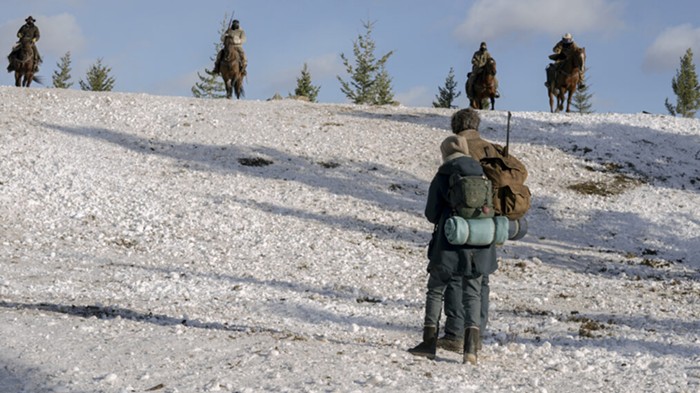The True Meaning of Communism in Last of Us

In the sixth episode of HBO’s popular post-apocalyptic/zombie The Last of Us, something magical happens in what remains of the once deep red state of Wyoming. The show’s main characters, cold and fatherless Joel (Pedro Pascal) and his bratty daughter figure Ellie (Bella Ramsey), come across communists living in a village whose upkeep is only matched by the compound run by a prepper, Bill (Nick Offerman), in what might be the year’s (if not decade’s) most powerful (certainly unexpected) piece of television, “Long, Long Time.” Though there is much to be made about the connection between the compound and the communards in The Last of Us, I will save those thoughts for another post. For now, I want to consider, with as much depth as possible, the function and meaning of communism in this episode.
After the zombie apocalypse, communism works. https://t.co/BVwZIyxYa6
— Bosque 🇺🇸 (@WildHoodLawyer) March 5, 2023
After encountering a Native American couple who seem straight out of the underappreciated Reservation Dogs, Joel and Ellie saddle up (Joel’s car was destroyed in an earlier episode) and head toward a land that’s supposed to be really, really bad and dangerous. No one comes back from there. What was won of the West is now totally lost. Go East.
Joel has to go West because he is looking for his brother, Tommy. As for Ellie, she has blood that could help protect humans from the zombie-making fungus. Not long after crossing a river, the two are surrounded by what looks like bandits on horses. A dog sniffs Joel and Ellie to determine if they are infected. They are not. They are allowed to enter the fortress village of well-fed and dressed people. It has running water, farmed food, waste management, and electricity.
The scene that explains how their social system:
Ellie: So are you, like, in charge?
Maria: No one person’s in charge. I’m on the council. Democratically elected, serving 300 people, including children. Everyone pitches in. We rotate patrols, food prep, repairs, hunting, harvesting. Everything you see in our town… greenhouses, livestock, all shared.
Tommy [Joel’s brother]: Collective ownership.
Joel: So, uh, communism.
Tommy: (Scoffs) Nah. Nah, it ain’t like that.
Maria: It is that. Literally. This is a commune. We’re communists.
Maria is right. This society, which is one of many in this post-apocalyptic and zombified America, is communist in the classic, Marxist (or historical materialist) sense. It did not abandon the achievements of capitalism but instead lifted them up (aufheben) to higher social order. Indeed, the Japanese philosopher Kohei Saito denounces this form of communism in his new and popular (popular in Japan) book Marx in the Anthropocene Towards the Idea of Degrowth Communism; he even argues that the master himself abandoned this progressive model of history late in his life.
I’ve read this & I have many thoughts. I will write a review, but not sure when I’ll have time or where it will end up. In the meantime, I can’t help but address what I think is a totally unsubstantiated claim in the book: Marx *abandons* historical materialism late in life. 1/x pic.twitter.com/0nm5AOGPXw
— Matt Huber (@Matthuber78) March 5, 2023
The fortress communism in The Last of Us is powered by a dam, practices modern farming, enjoys modern conveniences, and has a cinema. These communists did not, as Saito recommends, tear down the old order of value accumulation and start from scratch. Instead, they made the historically determined transition from capitalism to its higher and final stage. We call this progression historical materialism.
For reasons that are hard to believe, Joel decides to leave this functional, safe, and radically democratic village. He just doesn’t like it. Even if the brother he has been looking for since the second episode (Tommy) is finally found, communism is just not for him. When he and his daughter figure, Ellie (she was born and raised in the aftermath), return to the wilderness of zombies, evangelical cannibals, ruthless armies, and so on, they have this important exchange.
Ellie: So the way they ran stuff in Jackson, was how things used to be?
Joel: No, the country was too big for that. Back then, there were basically two main ways of lookin’ at things. Some people wanted to own everything.
Ellie: Mm-hmm.
Joel: And some people didn’t want anyone to own anything at all.
Ellie: Which one were you?
Joel: Neither. I just did my job.
Ellie: Which was… building?
Joel: That’s right. Houses, stores, that kinda thing. We were called “contractors.”
It’s interesting that Joel does not realize that “just [doing your] job” in a capitalist society is not neutral. He sold his labor to someone whose name was on the means to make it productive and produce the surplus value that, when in the climatic money form, constitutes the highest grade of social power of our day. Labor is not only dominated by this power but also owes its very existence to it. Capital posits labor and not the other way around. Labor is not in the capitalist, but the capitalist is all in labor. In this situation, a union does not offer salvation but only buys time.
[ad_2]
Share this news on your Fb,Twitter and Whatsapp
Times News Network:Latest News Headlines
Times News Network||Health||New York||USA News||Technology||World News